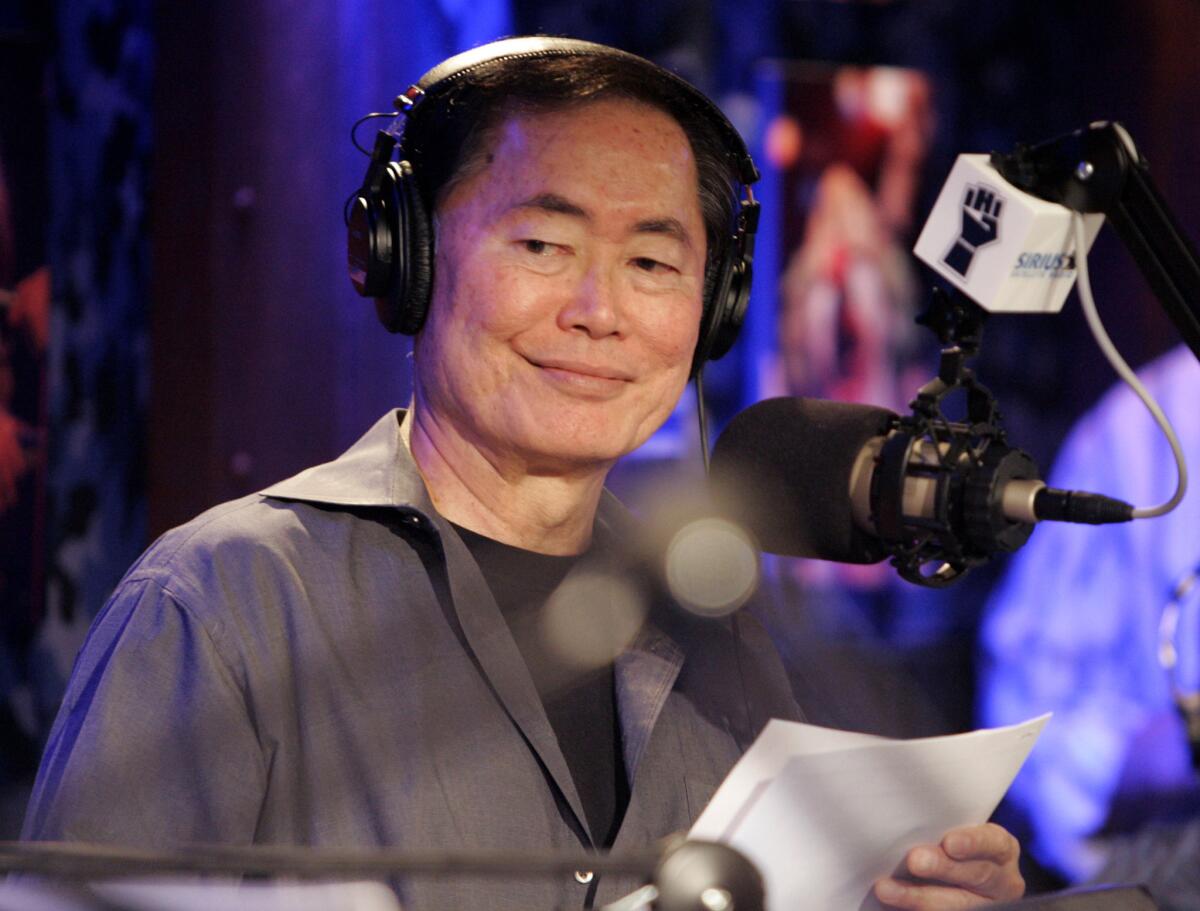Op-Ed: George Takei: How to bend social media to your will

George Takei, who played Sulu on the popular television show and movie series “Star Trek,” appearing on Howard Stern’s Sirius Satellite Radio program in New York on Jan. 9, 2006.
Back in 2011, a friend suggested I start a Twitter account. In those days, social media wasn’t yet a “thing.” Few actors, let alone those of my generation, were active online. I was known primarily from my supporting role on a television and film franchise that had first aired more than 40 years earlier, and had abstract future plans to star in a musical. Why would anyone care what I had to say? Twitter seemed silly to me, but, on a lark, I signed up.
At first I had a small following, mostly “Star Trek” devotees and early adopters from the LGBT community who recognized my name because I’d come out as gay in 2005. Although these fans welcomed me, I wasn’t convinced that this endeavor was going to yield much fruit.
Then, in March 2011, a disaster struck: An earthquake off the coast of Japan caused a devastating tsunami, leading to enormous loss of life and property. Feeling I should do something, I impulsively logged on to Twitter and put out a call for charitable donations. #TodayWeAreAllJapanese, I wrote. The hashtag went viral. Together, my followers and I helped raise millions of dollars in aid.
The success of that campaign sold me on Twitter — and sold Twitter on me: I nearly tripled my number of followers. Then I capitalized on my new reach to disseminate critical information about missing loved ones. It occurred to me that social media could harness collective action, and that by growing a large audience I could, at least on occasion, do some real good.
But how could I continue attracting followers? I put a lot of thought into that question, and perhaps my answers will be of use to readers trying to bend social media to their will.
When there’s a big news event like a natural disaster, people look to social media for information, and perhaps to learn what they can do to render assistance. But most of the time they simply want entertainment. To keep followers coming back to my feed, I knew I had to keep it lighthearted.
I also surmised that I should avoid dwelling on my own foibles. Celebrities often focus on their daily lives. But here’s the thing about social media: It ain’t about you. Fans don’t care about what you’re eating, where you’re shopping or what products you have to sell.
Above all, I’ve committed to giving people what they want, and if that means a healthy dose of trending cat videos, so be it: Grumpy Cat makes frequent guest appearances on my feed. I want my Twitter account to feel like a radio or television station, where viewers tune in because of the content, and then allow me the occasional commercial about my professional activities or political beliefs.
Each day I look around to see what people on the Internet are talking about, and then I share my favorite stories and images, either on Twitter or on my Facebook page. Fans make my job easy by sending me links they think I might enjoy. My husband, Brad, as well as interns and staffers, sort through their contributions and pick out the ones they think will be the most popular. Then we add commentary.
I think of myself as more of a social-media moderator than a content creator, and of each post as a sort of “pop-up community” where fans have an opportunity to interact with like-minded others.
Like I said, I aim to entertain. But occasionally I do sneak in weightier topics — not haphazardly but strategically. With input from Brad and the staff, I set my sights on a few causes near and dear to my heart: LGBT rights, the history and lessons of Japanese American internment, net neutrality and campaign finance reform.
When one of these topics is in the news, I pounce. For instance, when Indiana passed a “religious freedom” law that would have permitted business owners to discriminate against LGBT customers, I called for a boycott of that state. So did many others, and the Indiana Legislature ultimately stepped back from the ledge, changing the law for the better.
Fans come for the cat memes, and they stay for the activism.
George Takei is an actor, director, author and activist. He is the star of the musical “Allegiance.”
Follow the Opinion section on Twitter @latimesopinion and Facebook
More to Read
A cure for the common opinion
Get thought-provoking perspectives with our weekly newsletter.
You may occasionally receive promotional content from the Los Angeles Times.






